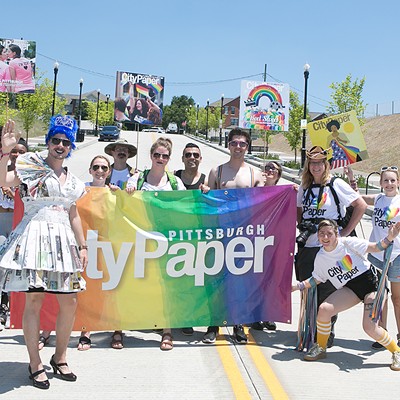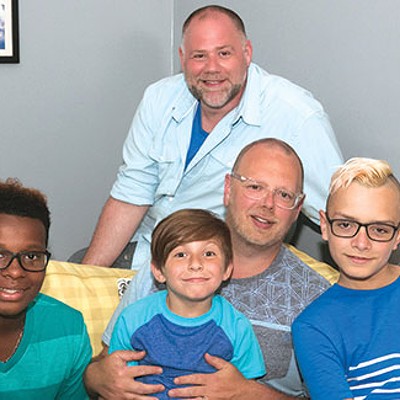“They had 17 years of marriage, they just never had a wedding day,” says Hens-Greco. “But they did all the hard work of marriage.”
After McBride’s ruling, Hens-Greco appealed the decision up to Pennsylvania’s Superior Court. The appellate court reversed McBride’s decision, and Judge H. Geoffrey Moulton wrote in his opinion that the U.S. Constitution “mandates that same-sex couples have the same right to prove a common-law marriage as do opposite-sex couples.”
Today, all lower courts in Pennsylvania must adhere to this decision, clearing the way for same-sex couples across the state to prove they were married, even if a spouse died prior to the 2014 law allowing them to legally marry.
“For a similar case that comes in Allegheny County, Tioga County, wherever,” says Hens-Greco, “those [lower] courts are bound to find that there is a retroactive right to a same-sex common-law marriage.”
Judge McBride’s law clerk, who did not provide her name, told City Paper on April 24 that it’s not customary for judges to comment on rulings outside of their official opinions.
Of course, Hunter is happy about the decision for his own case, but is also glad that it might help same-sex couples throughout the commonwealth.
“What is said in that opinion is pretty cool, I was kinda taken aback by it,” says Hunter. “That the right to marry pre-existed the [2014] ruling. Now, there is possibility that couples could be common-law married because of their circumstance.”
Levana Layendecker, of Equality Pennsylvania, a statewide LGBT-advocacy group, is also pleased with the decision.
“Things like this ruling make a huge difference in [LGBT] lives,” says Layendecker. “The most common story we hear, for elder LGBT folks, if one partner dies and the family does not like the partner, then they take the assets. It has contributed to elder LGBT poverty.”
Still, some question why rulings like these have to go through legal obstacles in the first place. John Paul is a news blogger at the Beaver Countian, and has been with his husband for 19 years. Paul and his spouse waited to get married until it was legal, and did so in 2014.
“Our marriage day was one day, but our life together has been much longer,” says Paul. “That didn’t magically start when the courts decided our rights had not been protected up to that point.”
Paul says Hunter’s case shows just how powerful a marriage contract can be, and how the laws, even two years after the U.S. Supreme Court declared same-sex marriage a constitutional right, are still stacked against same-sex couples. “I think a lot of heterosexual couples take advantage of that power that document gives you,” says Paul. “You can see with Judge McBride’s ruling, just how difficult that it was to prove those protections [without it].”
Judge Debbie Kunselman also serves on Beaver County’s Court of Common Pleas and has handled many LGBT cases in the county, like issuing transgender name changes and same-sex marriage licenses.
Kunselman wouldn’t comment on McBride’s ruling, but says that “judges have struggled with common-law marriage for a long time.” She believes the Superior Court’s ruling shows the importance of the appellate court system.
Kunselman believes battles like Hunter’s may become less frequent, because culture and the laws are changing in the favor of LGBT issues. “I think our society has evolved and accepted [LGBT people],” she says.
But Hens-Greco sees new same-sex marriage issues stemming from this common-law marriage decision, and future battles on the horizon. Like determining amounts of pension inheritances and divorce assets, since now there is a path for same-sex couples to prove marriage actually began before the date of legal marriage. Hens-Greco also sees more same-sex couples coming forward to prove marriages, even those who got together after the state abolished common-law marriages in 2005.
“What happens if someone has the same decision as [Hunter and Carter], but got together after 2005, but then something tragically happened before they were legally allowed to be married,” says Hens-Greco. “They are in this time warp. Are they just out of luck, because of that? If that case walked through my door, I would take it.”

















